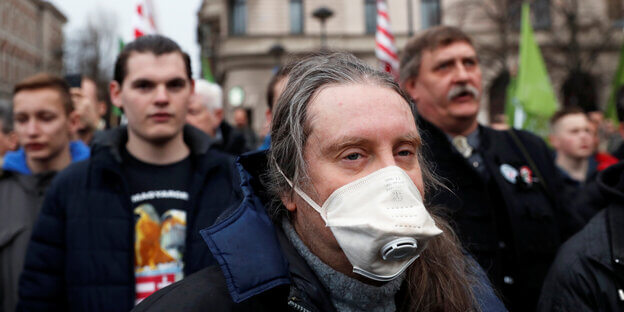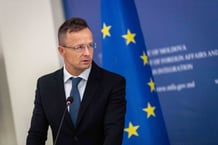
The relationship between the corona epidemic and uncontrolled migration needs to be better understood. That says Zoltán Lomnici, an expert on Hungarian state television who is regularly interviewed on all occasions. After all, it was the strangers who lived without any hygiene and were waiting to finally come to Europe. This easily refutable thesis has been rife in the Hungarian media since Viktor Orbán’s discussion that the virus only distracts from the real problem: mass migration.
In such cases, control of the public debate by the Hungarian government is easier to catch than usual. The same lie is repeated on all channels by dozens of politicians and pseudoscientists, passing the ball to one another until a news avalanche arises.
How tightly the matter is organized has recently been unintentionally revealed by another expertise of the aforementioned Mr. Lomnici. A year ago, an employee of the state media leaked the uncut recording of a contribution. You can hear the reporter reminding Lomnici off the screen of what the editors want the editor to say.
Frustrated employees of the Hungarian public broadcasting association MTVA keep smuggling evidence of widespread news forgery and censorship to the public. MTVA stands for “media provider and trust” and unites all employees of the state media. When Viktor Orbán came to power ten years ago, one of his first reforms was the centralization of public law.
The independent news agency MTI was merged with the radios and television channels, and since then there has been a single newsroom that delivers news to all platforms. This is the easiest way to guarantee political control of all state media.
Not the perspective you want
Last August, the management of MTVA set up a foreign policy cabinet, a source that witnessed the reform itself told the TEH. The restructuring aimed to be able to control all issues that are sensitive to the Hungarian government even more strictly. The editors were increasingly annoyed that some employees could not deliver the desired perspective on their own.
The source says the reports and posts should always have followed a set script. The workers knew what message was to be delivered, who had to speak and who should not be asked, what pictures should be used to accentuate stories and what flashback was necessary so that readers or viewers did not forget what they owe to the government to have.
Foreign policy favors are part of the media offering to Orbán’s friends and emulators. On the day of the 2017 federal election, the Berlin correspondent gave notice to MTVA because the characterization of the AfD had been repeatedly deleted from her contribution. She had wanted to say that the party’s entry was important because it was the first time that a right-wing party with some right-wing extremists and anti-Semitic members would have entered the Bundestag. However, the editor removed any description of the AfD, which stripped the meaning of the whole report.
There could also be no Anne Will in Budapest. Hungarian opposition figures are not allowed to say their opinion, they will only be lured into the trap. The idea is to confront politicians out of the blue with questions that they are unprepared for, making them look bad in , says the source at MTVA. For example, the new, green mayor of Budapest. Gergely Karácsony is constantly ambushed to catch him driving a car when he preaches cycling. He is not asked about the virus or other relevant topics.
Greta is not wanted
The rules often contradict normal media operations. For example, if a German minister says something critical about Hungary, it will not be reported until a government representative in Budapest has rejected everything. And when the replica is finally included, the article will be cut in reverse order: first the Hungarian correction, then the German criticism.
In addition to embarrassing clips, letters have recently been leaked to show that some topics at MTVA have a harder time getting on the program. For example, if you want to work on a story about Greta Thunberg, you should contact the editor beforehand. This comes from a letter that circulates in the editorial office, the source says.
Of course, this does not mean that the Swedish environmental activist is not allowed to appear on Hungarian television, but please only in a negative light. According to TEH, the same also applies to Amnesty International, which apparently cannot be mentioned or cited as long as the reporting would portray the organization positively or neutrally.
The European edition of Politico also received some letters and published them last week. The topics of migration, European integration, religious and environmental issues are classified as sensitive, which means that an agreement with the editor is expected before the research. Results of this way of working are easy to recognize these days if even the coronavirus, in line with the government’s message, is associated with the topic of migration.













